- Home
- Robert B. Parker
Painted Ladies Page 6
Painted Ladies Read online
Page 6
“And you didn’t think someone would discover this coincidence?”
“That’s all it is,” she said.
“I hate coincidences,” I said. “They don’t do anything for anybody, and they muddy up the water to beat hell.”
She studied her anchovies some more.
“Who’s her father?” I said.
Winifred shook her head silently.
“I’m almost sure there has to be one,” I said.
“He died,” Winifred said.
“Sorry to hear that,” I said. “Is it recent?”
“He died a long time ago.”
“What was his name?” I said.
She shook her head again.
“How come Missy won’t talk about him, either?”
Winifred took in a long, slow breath. It sounded a little shaky. Then she stood.
“Thanks for lunch,” she said, and left me alone with her anchovies.
Spenser, master inquisitor.
21
The special agent in charge of the Boston FBI office was a guy named Epstein who looked less dangerous than a chickadee, and had killed, to my knowledge, two men, both of whom had probably made the same misjudgment. I had coffee with him in a joint on Cambridge Street.
“Winifred Minor,” he said. “Why do you ask?”
“She used to be FBI,” I said.
“Yep, but why do you ask?”
“You know I’m involved with that art theft where the guy got blown up,” I said.
“Ashton Prince,” Epstein said. “Hermenszoon painting.”
“Wow,” I said. “Sees all, knows all.”
“Only a matter of time,” Epstein said, “before I’m director.”
“No dresses,” I said.
“Prude,” Epstein said. “What’s your interest in Winifred Minor?”
There was a platter of crullers under a glass cover on the counter. I eyed them.
“She’s a claims adjuster now,” I said. “For a big insurance company.”
“Shawmut,” Epstein said.
“You keep track,” I said.
“I do,” Epstein said.
“They insured the painting,” I said.
“And the claim is her case,” Epstein said.
“And her daughter was a student of Prince’s, and probably they had a relationship.”
“Which is to say he was fucking her?” Epstein said.
“You civil servants speak so elegantly,” I said. “But yes. I believe he was.”
“Could all mean nothing,” he said.
“Could,” I said.
“But it’s probably more productive to think it means something,” Epstein said.
“You know who the father is, or was?” I said.
“Didn’t know Winifred was married,” Epstein said.
“Don’t know that she was.”
Epstein nodded.
“How old’s the kid,” he said.
“Nineteen, twenty,” I said.
“So Winifred was still with the Bureau,” Epstein said, “when the kid was born.”
I nodded. Epstein drank some of his coffee. I studied the plate of crullers some more.
“You ask either of them about the father?” Epstein said.
“I did,” I said.
“And?”
“They won’t talk about him,” I said.
“When the baby was born she probably used her health insurance,” Epstein said. “Bureau will have a record. I’ll see what I can find out. What’s the kid’s name?”
“Melissa Minor,” I said. “Goes by Missy.”
Epstein nodded. He didn’t write it down. He rarely wrote things down. I sometimes thought he remembered everything he’d ever heard.
“Why are you interested in the father?”
“Seems odd they won’t talk about him,” I said.
Epstein nodded.
“Anything’s better than nothing,” Epstein said.
“But harder to come by,” I said. “You know Winifred Minor?”
“Casually,” Epstein said. “Bureau regarded her as a good agent, maybe a little gung ho.”
“Aggressive?”
“Yep. Probably proving something ’cause she was a female agent,” Epstein said.
“She know anything about explosives?”
Epstein shrugged.
“No reason she should,” he said. “I don’t.”
“I thought special agents in charge knew everything,” I said.
“They do,” Epstein said. “I was just being modest.”
22
It had snowed in the night, and the world looked very clean, which I knew it not to be. But illusion is nice sometimes.
Susan was at a conference in Fitchburg, so Pearl was spending the day with me. We got to work a little before nine, and Pearl scooted into the office across the hall from mine to see Lila, the receptionist. Lila gave her a cookie, which she always did when Pearl came to visit, which may have been why Pearl was always eager to see her.
“Hi, big boy,” Lila yelled to me.
I stopped and stuck my head in her doorway.
I said, “How’s the modeling career, Toots?”
“I think I got a photo gig,” she said. “Car dealer on the north shore.”
“I hope you don’t get too successful,” I said. “I like seeing you across the hall.”
Pearl was sitting still and focused, studying the drawer in Lila’s desk where she knew the cookies were kept, on the off chance that today, for the only time, Lila would give her another one. But Lila and I had agreed that since Pearl was insatiable, and you’d have to say no eventually, you might as well say no after one cookie.
“Sooner or later,” Lila said, “we’ll have to stop meeting like this.”
I nodded sadly and jerked my head at Pearl. We went across the hall to my office. As I took out my keys, Pearl stopped stock-still and began to growl. It wasn’t her usual sort of rambunctious there’s-a-dog-I-don’t-know-passing-the-house growl. This was primordial. A low, steady sound that seemed to pulsate. I stared at her. The hair was up along her spine. Her nose was pressed against the crack where the closed door met the jamb. The growl was unvarying. It was as if she didn’t need to breathe. There was a hint of snowmelt on the floor. I looked down the hall. It was dry, except at Lila’s office, where I’d left some wet footprints. I stepped to the side, away from the door, and took Pearl with me.
Pearl was idiosyncratic. She could be growling at the doorknob. But the growl was so malevolent. I reached silently over and tried the doorknob. The door was locked. I leaned my head around the jamb and put my ear to the door. I heard nothing. Maybe Pearl was wrong, though she was certainly insistent. And someone had left a trace of melted snow outside my door. And I was working on a case involving people who had blown someone into small pieces.
I took Pearl by the collar and led her back into Lila’s office.
“Your door lock?” I said.
“Sure,” she said.
“Okay, give her another cookie while I go out. Then lock the door behind me and keep her here while I do a little business.”
“What’s going on?” Lila said.
“Official detective business,” I said.
“Yeah?”
“If anything unusual happens in the hallway or my office, keep your door locked and call nine-one-one.”
“ ‘Unusual’?”
“Yeah.”
“Unusual, like what?” she said.
“Oh,” I said. “The usual, you know. Gunfire, that kind of stuff.”
“Fucking gunfire?” she said.
“Just giving you a hypothetical example,” I said.
“You mean, like, I’m in danger?”
“Only if you flash that smile,” I said.
“I’m serious,” she said.
“No one is interested in you, except, of course, me,” I said. “Sit tight and you’re fine.”
“Me and Pearl,” she said.
&
nbsp; I nodded. I was watching my office door as we talked. I didn’t want to take my gun out, thus causing Lila to freak. But I let my hand stay close to my hip.
“What do I tell my employers?” she said. “If any of them come in.”
“Tell them you’re doing me a favor,” I said.
“Most of them don’t like you,” she said.
“Oh, of course they do,” I said. “How could they not?”
“And they pay my salary,” she said.
“But do they feel about you the way I do?” I said.
“Probably,” she said. “But nobody’s due in today until late afternoon, anyway.”
“I owe you,” I said.
“You certainly do,” Lila said.
“Lock the door,” I said.
23
My office was on the second floor, with windows that opened on Berkeley Street. I went out into the hall and down the back stairs to the alley, where my car was parked illegally. The snow was still drifting down halfheartedly. I got a pair of binoculars from the car and ducked with my head down across Berkeley Street in the middle of the block, and got glared at. If there was somebody in my office, they would be watching the door, not looking at the street.
I went into the Schwartz Building across the street from my office and up to the second floor. It was the office where, when the building was in another incarnation, a dark-haired art director with great hips had often been visible from my office, bending over her board. I slid behind a counter, stood at the window, and adjusted the binoculars.
A clerk said, “Excuse me, sir. May I help you with something?”
“Shhh,” I said. “Surveillance.”
He apparently didn’t know what to say about that, so he stood and stared at me. With the binoculars I brought my office into focus. There were two of them. One sitting behind my desk with an Uzi-like automatic weapon, maybe a Colt M4. The other guy stood to the right of my door, so that he’d be behind the door when it opened. He had a handgun. Neither of them moved around any. As far as I could see from where I was, neither of them said anything.
I lowered the binoculars and looked at the clerk, who was still staring at me.
“Thanks,” I said, and left.
I went back downstairs and out, and crossed Berkeley at the corner, with the light. I hated being glared at. In the alley, I took off my coat and put it on the backseat, along with the binoculars. Then I sat in my car, took out my gun, and made sure there was a round in the chamber. I got an extra magazine from the glove compartment and slipped it into my hip pocket. Then I cocked the gun and got out and went back up to my floor.
Lila’s door was still closed. I stood against the wall to the right of my door and reached out and unlocked it. Nothing happened. I took the key from the lock, put it in my pocket. Then I knelt down and pushed the door open. I was out of the line of fire, low against the wall of the corridor.
Nothing happened.
I waited.
Time was on my side. The longer they sat and stared at the silent, empty doorway, the more it would be on my side. They didn’t know how many I was. They didn’t know which side of the doorway I was on. Or how close. If I were them I’d come out together, shooting in both directions as I came. I backed a little down the corridor and lay flat on the floor with my gun ready. It was a new gun, an S&W .40-caliber semiautomatic. There were eleven rounds in the magazine and one in the chamber. If that wasn’t enough, I probably wasn’t, either.
Most of the people on my floor were in sales. And except for Lila, who served as a communal secretary, there was rarely anyone around during the day. No one moved in the hall. Nothing happened at my office door. I was listening so hard that my breath seemed loud. I moved my shoulders a little, trying to keep them loose. I inhaled gently, trying to be silent.
They came out shooting. The Uzi sprayed the corridor away from me. The handgun guy fired several slugs over my head before I shot him. The man with the Uzi spun toward me, and I shot him, too. They both went down. The man with the handgun never moved. The guy with the Uzi spasmed maybe twice and then lay still. I stayed prone on the hall floor with my gun still aimed, taking in air. Then I stood and walked over and looked at them. They were dead. I uncocked my new gun and holstered it, and heaved in some more air.
Lila had called 911. I could hear the distant sirens rolling down Boylston Street.
24
Pearl and I spent pretty much the rest of the day in close contact with the Boston Police Department. First came the prowl-car guys. Then the precinct detectives, and the crime scene people. About an hour after it started, Belson came in and looked at me and shook his head.
“Wyatt Fucking Earp,” he said.
I shrugged.
Belson went and talked with a crime scene investigator. Then he went over to the couch and scratched Pearl’s right ear. Her short tail thumped against the cushion.
“She been out?” he said.
“Lila across the hall,” I said. “Took her out about a half-hour ago.”
“Okay,” Belson said. “Then let’s you and me gather at your desk and chat.”
One of the precinct detectives said, “I’ve questioned him, Frank. Want me to bring you up to speed?”
“No,” Belson said.
I sat at my desk. Belson pulled a chair up and sat across the desk from me.
“Crime scene guy tells me one round each. Middle of the chest both times.”
I nodded again.
“Annie Fucking Oakley,” Belson said. “Talk to me.”
“You know about the painting got stolen?” I said. “And the guy got blown up out on Route Two trying to get it back?”
“The guy you were bodyguarding?”
“Yep.”
“Nice,” Belson said. “Assume I don’t.”
“Okay,” I said.
I told my story.
As I told it, Belson sat perfectly still and listened. Like Epstein, he didn’t take notes. He rarely did. But two years later, he’d be able to give you what I’d said verbatim. Cops.
When I finished, he said, “Dog saved your ass.”
I nodded.
“She did.”
“You figure it’s connected to the art theft and the murder?”
“Don’t you?” I said.
Belson shrugged.
“You’ve annoyed a lot of people in the last twenty years,” he said.
“Why limit it?” I said.
“You’re right, you been good at it all your life.”
“Everybody gotta be good at something,” I said.
“But,” Belson said, “it don’t do us much good picking names of people might want you dead.”
“Too many,” I said.
“So,” Belson said, “assume it’s connected. Why now?”
“Don’t know,” I said. “I been poking around at it since it happened. I must have poked something live.”
“Where you been poking recently,” Belson said.
“Walford University. Winifred Minor. Her daughter. Couple of her daughter’s classmates.”
“Most recent?”
“Missy and Winifred Minor,” I said.
“Missy Minor,” Belson said.
“Cute name,” I said.
“Cute,” Belson said. “You know either of the stiffs?”
“No,” I said.
“We’ll see what we can find out,” Belson said.
“Lemme know,” I said.
“Might,” Belson said. “You turned your piece over to the crime scene people?”
“Yep.”
“You got another one?” Belson said. “People trying to kill you and all.”
I reached into my desk drawer and took out a .38 Chief’s Special.
“Loaded,” Belson said. “No trigger lock.”
“Got a nice holster,” I said.
“Okay,” Belson said. “In that case, I won’t run you in.”
“Stern,” I said. “But compassionate.”
“And if they succeed in killing you next try,” Belson said, “I’ll try to catch them.”
“That’s encouraging,” I said.
25
I was halving oranges and squeezing the juice into a glass in my kitchen when Susan appeared, fresh from the shower and the makeup mirror. I took a deep breath. Whenever I saw her I took a deep breath. It was more dignified than yelling “Jehoshaphat!”
“Isn’t that a lot of trouble?” Susan said. “I like the stuff in a carton fine.”
“That’s pasteurized,” I said. “I want the authentic experience. Unprocessed. Nothing between me and the orange, you know? Mano a orange-o!”
I gave her the glass and squeezed some for myself.
“You are, as they say in psychotherapeutic circles, a weird dude,” Susan said.
“And yet you love me,” I said.
“I know.”
“It’s all about the sex,” I said. “Isn’t it.”
“Not all,” Susan said. “You cook a nice breakfast, too.”
She had on tight black jeans tucked into high cavalier boots, the kind where the top folds over. Her open-collared shirt was white, and over it she wore a small black sweater vest. It set off her black hair and big, dark eyes. She probably knew that.
“Good sex and a nice breakfast,” I said. “An unbeatable combination.”
Susan smiled.
“I don’t recall anyone using the word ‘good,’ ” she said.
“Seems to me,” I said, “you were singing different lyrics an hour ago.”
She actually flushed a little bit.
“Don’t be coarse,” she said.
“Not even in self-defense?” I said.
She grinned at me.
“Well, maybe,” she said. “We were quite lively. Weren’t we.”
“With good reason,” I said.
I finished my orange juice and poured us both some coffee. Susan wasn’t anywhere near finishing her orange juice. But she might never finish it. Over the years I’d learned to proceed and let her sort it out.
Pearl was asleep on her back on the couch, with her head lolling off. She was waiting, I knew, for actual food to be prepared and served, at which time she’d get off the couch and come over and haunt us.

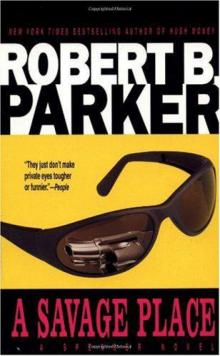 A Savage Place s-8
A Savage Place s-8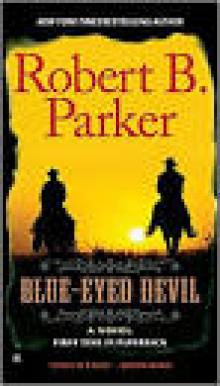 Appaloosa / Resolution / Brimstone / Blue-Eyed Devil
Appaloosa / Resolution / Brimstone / Blue-Eyed Devil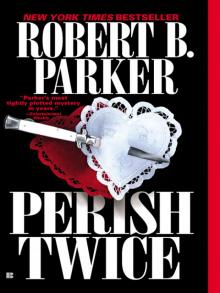 Perish Twice
Perish Twice Spare Change
Spare Change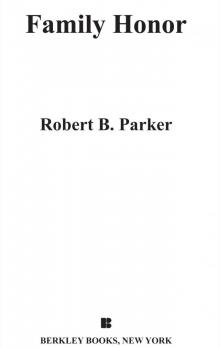 Family Honor
Family Honor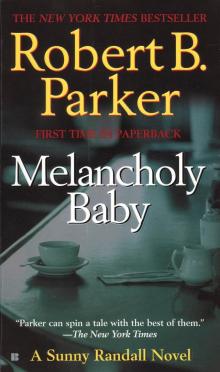 Melancholy Baby
Melancholy Baby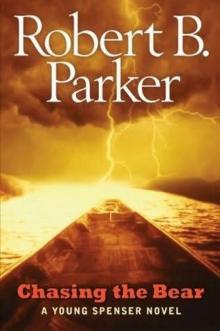 Chasing the Bear
Chasing the Bear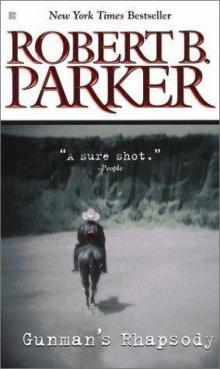 Gunman's Rhapsody
Gunman's Rhapsody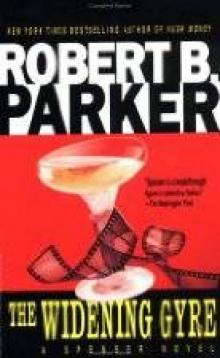 The Widening Gyre
The Widening Gyre Thin Air
Thin Air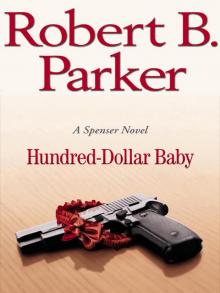 Hundred-Dollar Baby
Hundred-Dollar Baby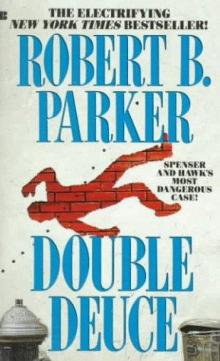 Double Deuce s-19
Double Deuce s-19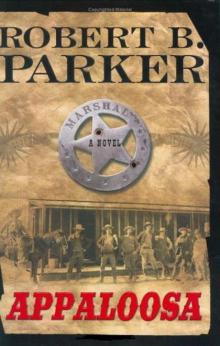 Appaloosa vcaeh-1
Appaloosa vcaeh-1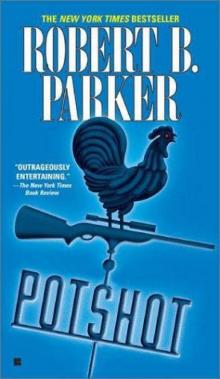 Potshot
Potshot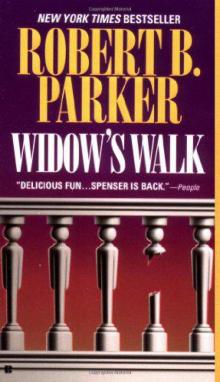 Widow’s Walk s-29
Widow’s Walk s-29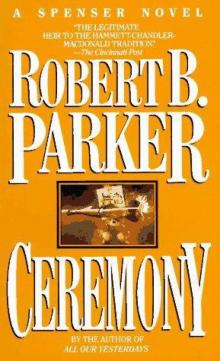 Ceremony s-9
Ceremony s-9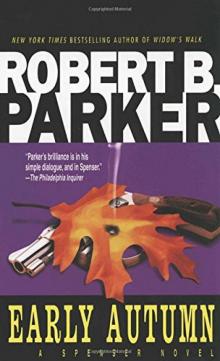 Early Autumn
Early Autumn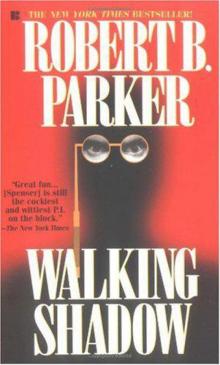 Walking Shadow s-21
Walking Shadow s-21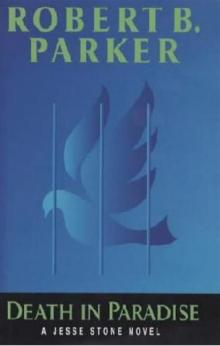 Death In Paradise js-3
Death In Paradise js-3 Shrink Rap
Shrink Rap Blue-Eyed Devil
Blue-Eyed Devil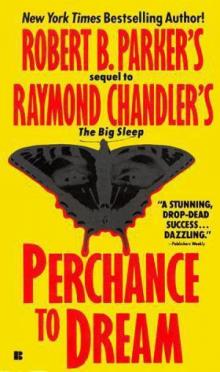 Perchance to Dream
Perchance to Dream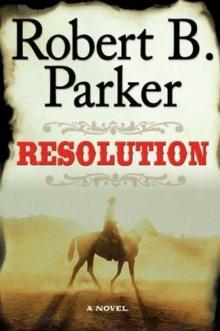 Resolution vcaeh-2
Resolution vcaeh-2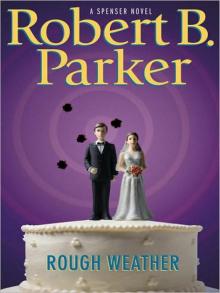 Rough Weather
Rough Weather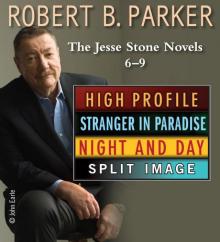 The Jesse Stone Novels 6-9
The Jesse Stone Novels 6-9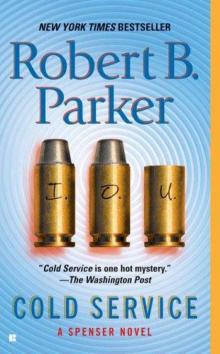 Cold Service s-32
Cold Service s-32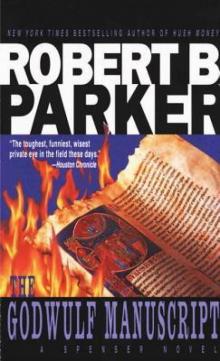 The Godwulf Manuscript
The Godwulf Manuscript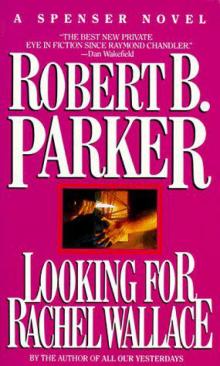 Looking for Rachel Wallace s-6
Looking for Rachel Wallace s-6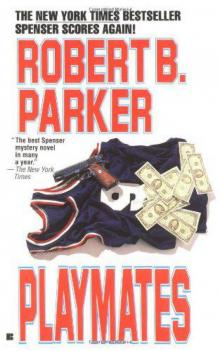 Playmates s-16
Playmates s-16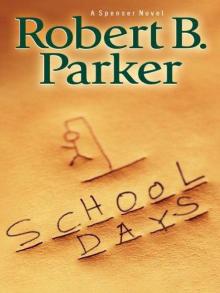 School Days s-33
School Days s-33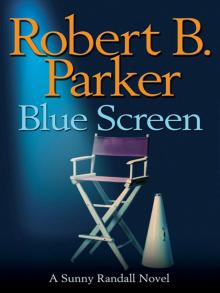 Blue Screen
Blue Screen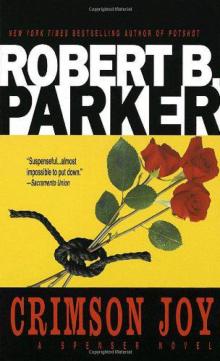 Crimson Joy
Crimson Joy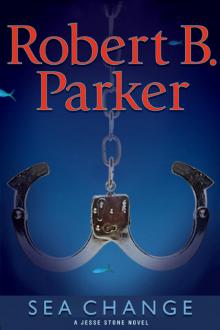 Sea Change js-5
Sea Change js-5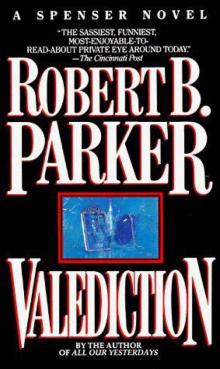 Valediction s-11
Valediction s-11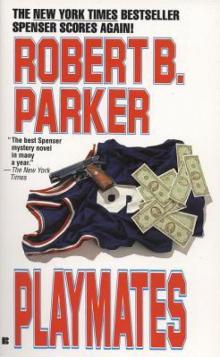 Playmates
Playmates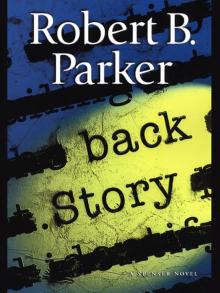 Back Story
Back Story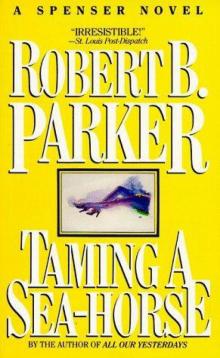 Taming a Sea Horse
Taming a Sea Horse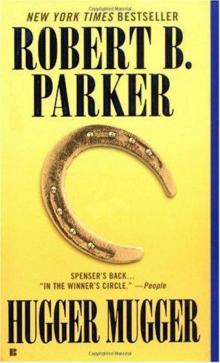 Hugger Mugger
Hugger Mugger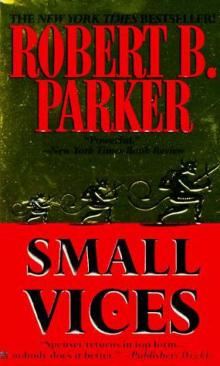 Small Vices s-24
Small Vices s-24 Silent Night: A Spenser Holiday Novel
Silent Night: A Spenser Holiday Novel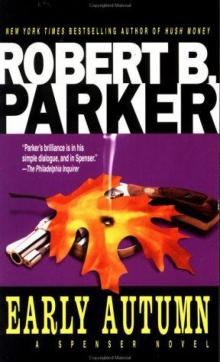 Early Autumn s-7
Early Autumn s-7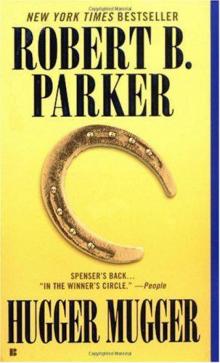 Hugger Mugger s-27
Hugger Mugger s-27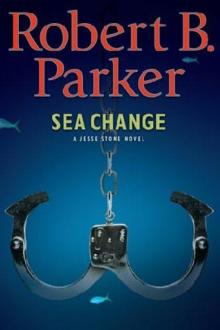 (5/10) Sea Change
(5/10) Sea Change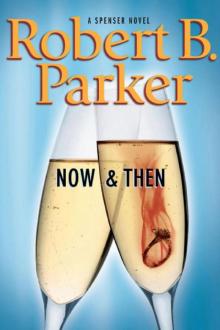 Now and Then
Now and Then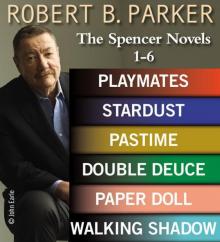 Robert B. Parker: The Spencer Novels 1?6
Robert B. Parker: The Spencer Novels 1?6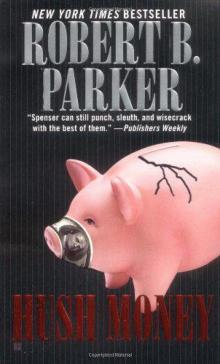 Hush Money s-26
Hush Money s-26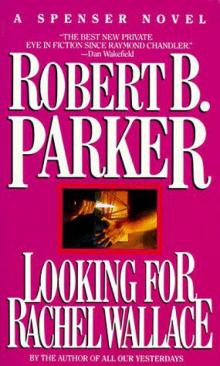 Looking for Rachel Wallace
Looking for Rachel Wallace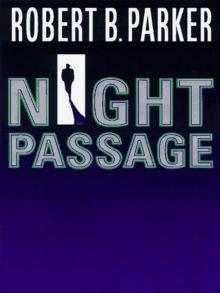 Night Passage
Night Passage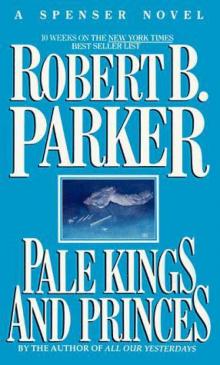 Pale Kings and Princes
Pale Kings and Princes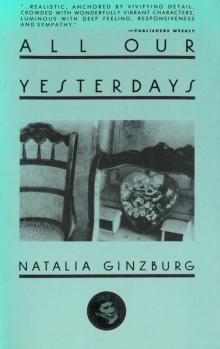 All Our Yesterdays
All Our Yesterdays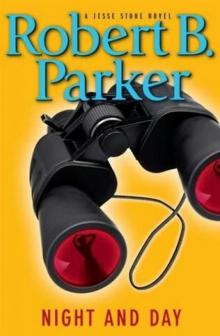 Night and Day js-8
Night and Day js-8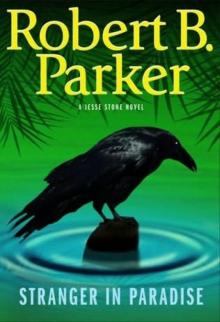 Stranger in Paradise js-7
Stranger in Paradise js-7 Double Play
Double Play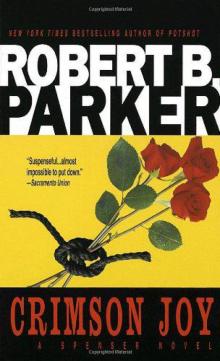 Crimson Joy s-15
Crimson Joy s-15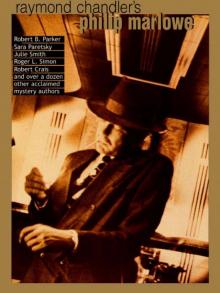 Raymond Chandler's Philip Marlowe
Raymond Chandler's Philip Marlowe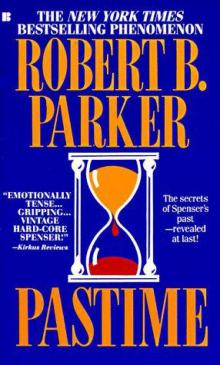 Pastime
Pastime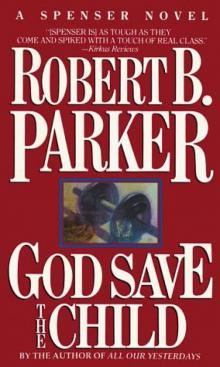 God Save the Child s-2
God Save the Child s-2 Bad Business
Bad Business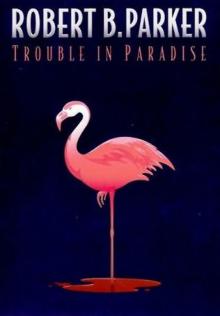 Trouble in Paradise js-2
Trouble in Paradise js-2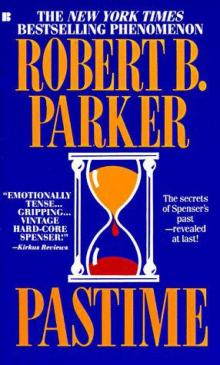 Pastime s-18
Pastime s-18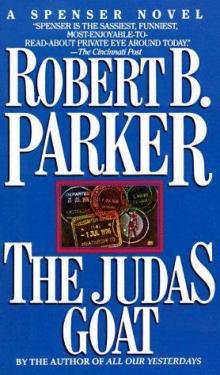 The Judas Goat s-5
The Judas Goat s-5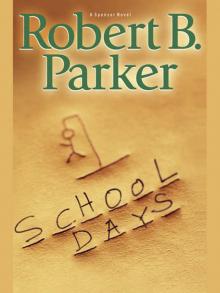 School Days
School Days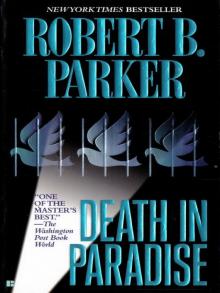 Death In Paradise
Death In Paradise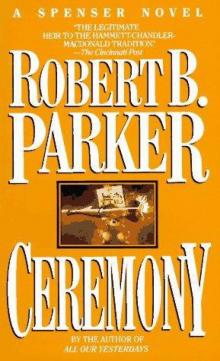 Ceremony
Ceremony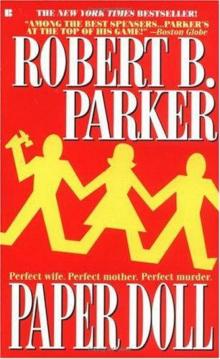 Paper Doll s-20
Paper Doll s-20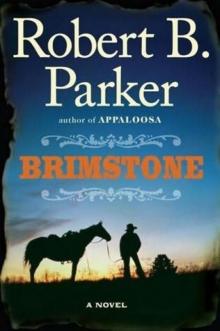 Brimstone vcaeh-3
Brimstone vcaeh-3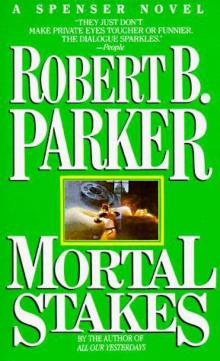 Mortal Stakes s-3
Mortal Stakes s-3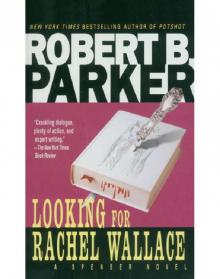 Spencer 06 - Looking for Rachel Wallace
Spencer 06 - Looking for Rachel Wallace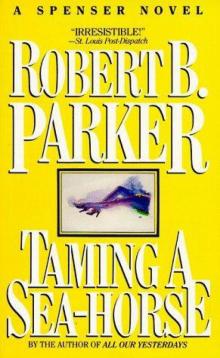 Taming a Sea Horse s-13
Taming a Sea Horse s-13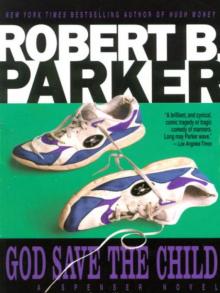 God Save the Child
God Save the Child Chance
Chance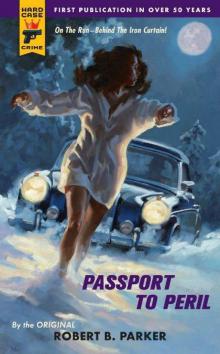 Passport To Peril hcc-57
Passport To Peril hcc-57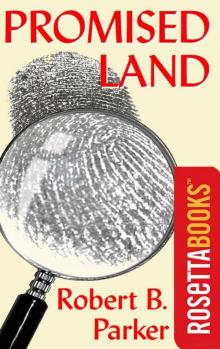 Promised Land
Promised Land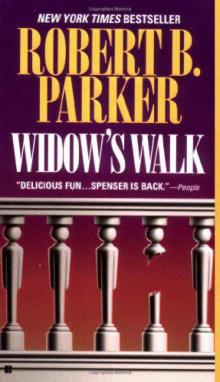 Widow’s Walk
Widow’s Walk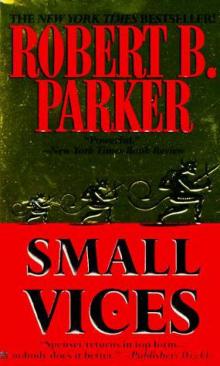 Small Vices
Small Vices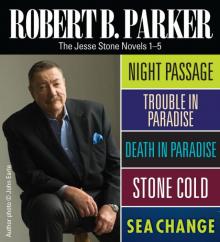 Robert B Parker: The Jesse Stone Novels 1-5
Robert B Parker: The Jesse Stone Novels 1-5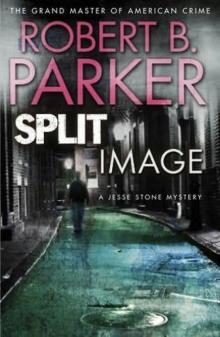 Split Image js-9
Split Image js-9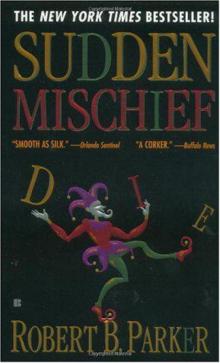 Sudden Mischief s-25
Sudden Mischief s-25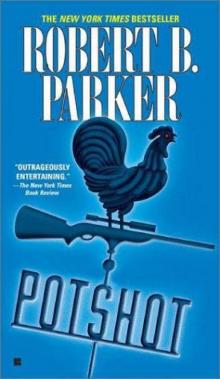 Potshot s-28
Potshot s-28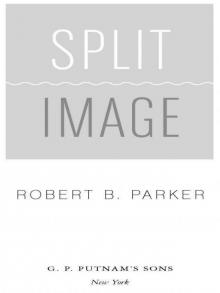 Split Image
Split Image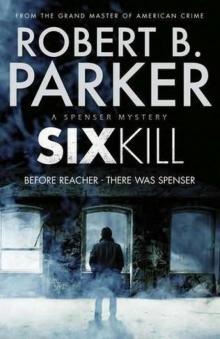 Sixkill s-40
Sixkill s-40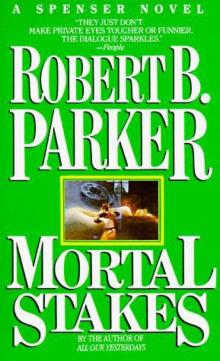 Mortal Stakes
Mortal Stakes Stardust
Stardust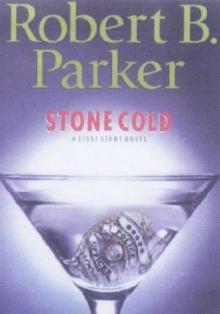 Stone Cold js-4
Stone Cold js-4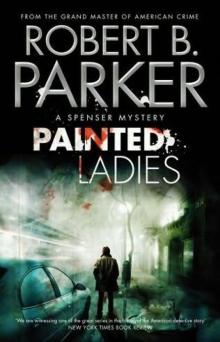 Painted Ladies s-39
Painted Ladies s-39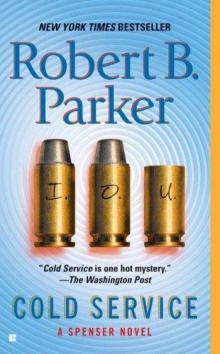 Cold Service
Cold Service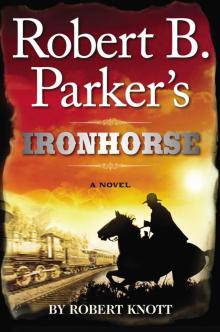 Ironhorse
Ironhorse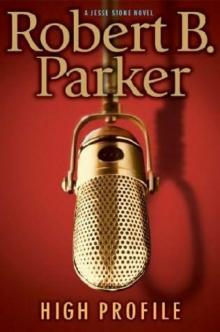 High Profile js-6
High Profile js-6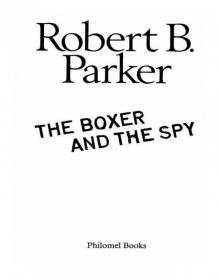 The Boxer and the Spy
The Boxer and the Spy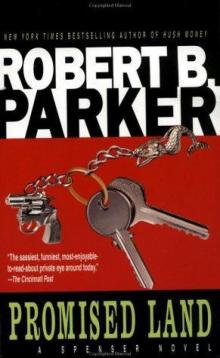 Promised Land s-4
Promised Land s-4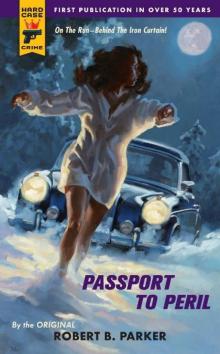 Passport to Peril (Hard Case Crime (Mass Market Paperback))
Passport to Peril (Hard Case Crime (Mass Market Paperback))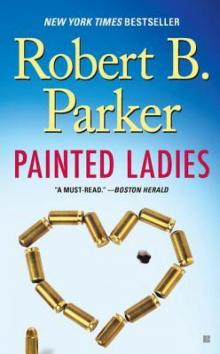 Painted Ladies
Painted Ladies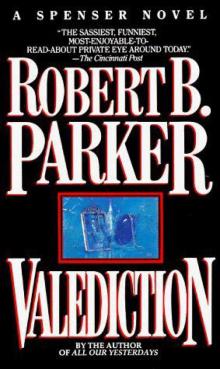 Valediction
Valediction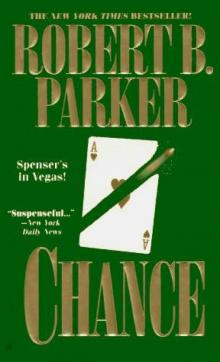 Chance s-23
Chance s-23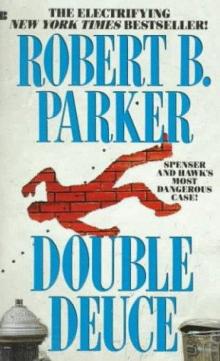 Double Deuce
Double Deuce Wilderness
Wilderness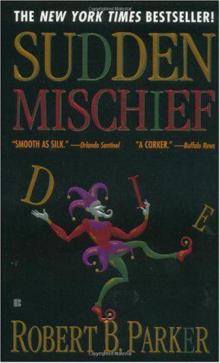 Sudden Mischief
Sudden Mischief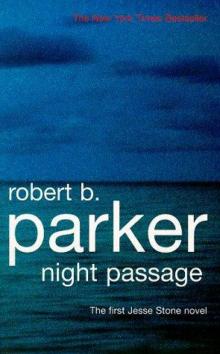 Night Passage js-1
Night Passage js-1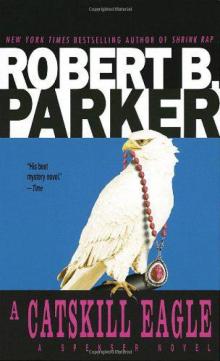 A Catskill Eagle
A Catskill Eagle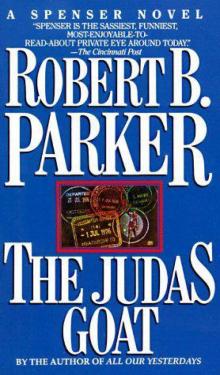 The Judas Goat
The Judas Goat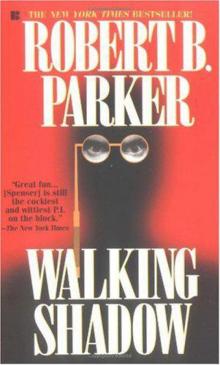 Walking Shadow
Walking Shadow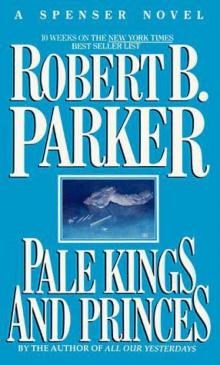 Pale Kings and Princes s-14
Pale Kings and Princes s-14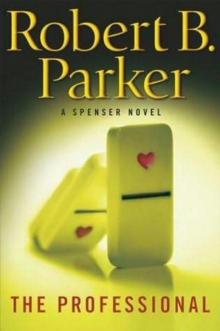 The Professional
The Professional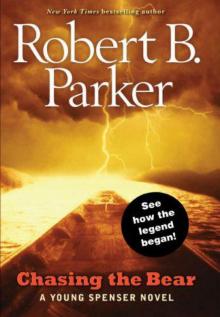 Chasing the Bear s-37
Chasing the Bear s-37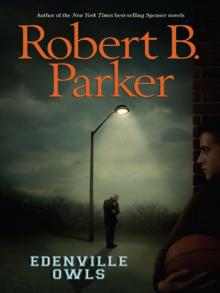 Edenville Owls
Edenville Owls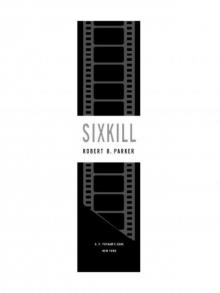 Sixkill
Sixkill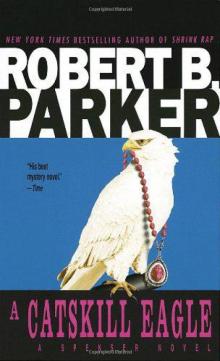 A Catskill Eagle s-12
A Catskill Eagle s-12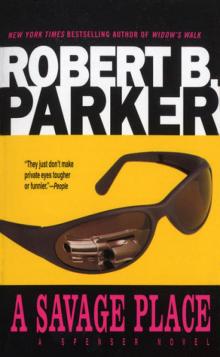 A Savage Place
A Savage Place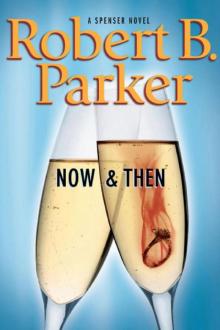 Now and Then s-35
Now and Then s-35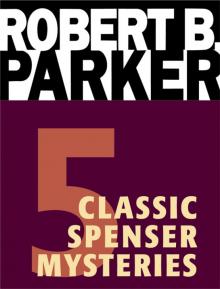 Five Classic Spenser Mysteries
Five Classic Spenser Mysteries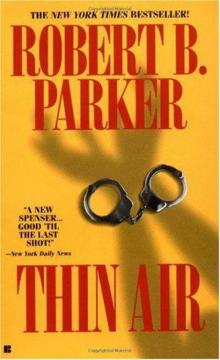 Thin Air s-22
Thin Air s-22